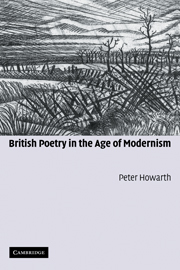1 - Inside and outside modernism
Published online by Cambridge University Press: 20 October 2009
Summary
Like many of the Lyrical Ballads, Wordsworth's ‘Simon Lee’ ends with a sense of disappointment, just as it promises. After describing for nine stanzas the hopeless situation of a poor and weak old huntsman increasingly unable to support himself and his wife, the poem abruptly reins itself in, and apologises for going nowhere:
My gentle reader, I perceive
How patiently you've waited,
And I'm afraid that you expect
Some tale will be related.
O reader! had you in your mind
Such stores as silent thought can bring,
O gentle reader! you would find
A tale in every thing.
What more I have to say is short,
I hope you'll kindly take it;
It is no tale; but should you think,
Perhaps a tale you'll make it.
This moment of self-awareness is simultaneously a hope and a warning. It expresses faith in the power of well-stocked minds to make a meaning from the most unpromising materials. But then, why write this particular poem, if the reader can find a tale wherever he or she looks? On the other hand, if the poem ‘Simon Lee’ is necessary to making some sort of tale – for moral sense-making, for the ‘salutary impression’ Wordsworth's 1800 Preface promised this poem would offer – it is also a warning that whatever tale we make of it will not be faithful to the poem's own nature, for ‘it is no tale’.
- Type
- Chapter
- Information
- British Poetry in the Age of Modernism , pp. 15 - 63Publisher: Cambridge University PressPrint publication year: 2005



